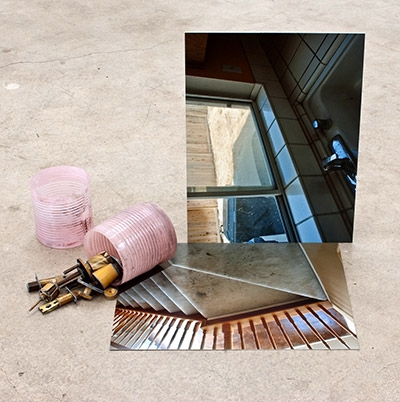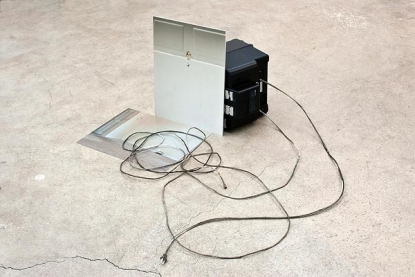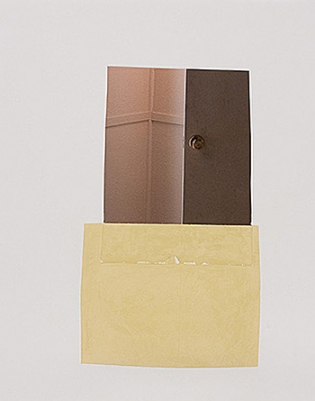Feature: Reviews
Lucy Puls - Repossessed: Brief Madness
- Electric Works
- San Francisco, CA
- October 22nd - November 26th, 2010
The title of Lucy Puls’ recent exhibition at Electric Works can be deceptive. In Repossessed: Brief Madness, photographs of parts of foreclosed homes are combined with household detritus to make sculptures, and abstracted fragments of those photos form the basis of minimalist collages. A television, a sink and a chandelier are turned on their sides; cables (reconstructed by Puls with paper and photographs) snake across the floor and dangle down from one collage into another. But madness is not a word you can apply to Puls’ work. Her pieces are so carefully constructed, and composed with such control, that they seem almost mathematical in their precision.
While contemplating Vesania Brevis, a series of 20 collages that combine blocks of muted color with cuts from photos, a man approached to tell me he had finally “got it!” and began to explain a pattern he had found in the series. Puls’ work seems to demand this level of concentration. She has turned ubiquitous objects, and images of those objects, into elegant geometric forms; in one photo panel the shape and texture of a doorknob become something delicate and beautiful. Puls achieves this by making the knob the center-point of the shot, and rotating it so that we are not looking at a door as we know it. Removed from our understanding of what the photo represents, the object is transformed into its purest form, offset by the clean horizontal lines of the door’s edge and frame. An electric socket in an empty room becomes equally evocative.
Nothing is overlooked by Puls – perspective, color and texture are in constant dialogue with each other, giving a sense of balance and completeness to every piece. Even the shadow created by a mounted photograph leaning against a television has been considered (or so it seems).
Puls is hardly the first artist to recycle disposable items, but in discovering their formal beauty, her approach is unusual. Where others have dwelt on the abundance of consumer stuff that fills our lives, Puls conveys a sense of fragility and value. Real objects seem to be disintegrating into paper representations. This transience redresses our relationship to objects, asking that they be savoured rather than cast carelessly aside.



